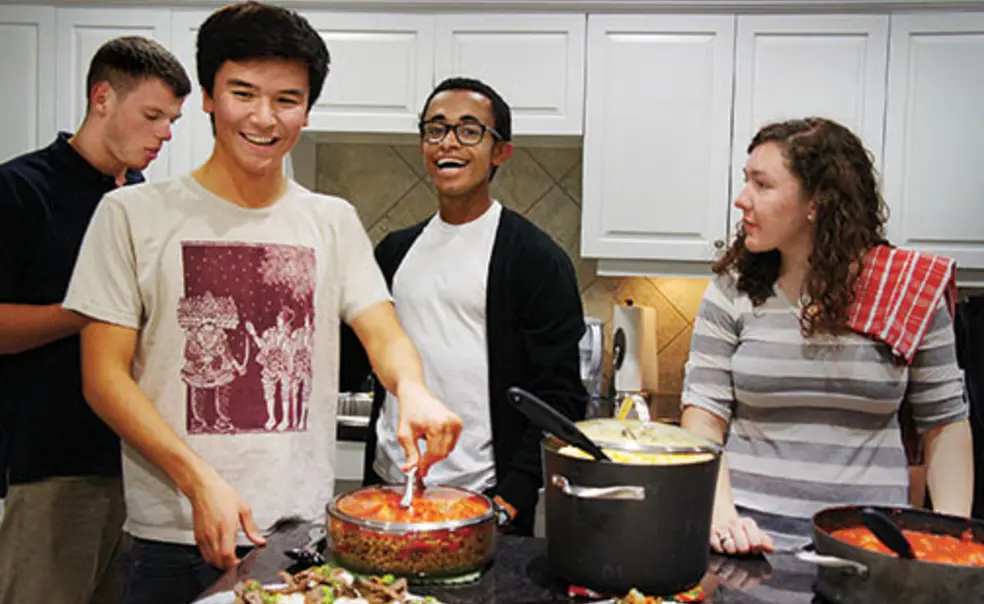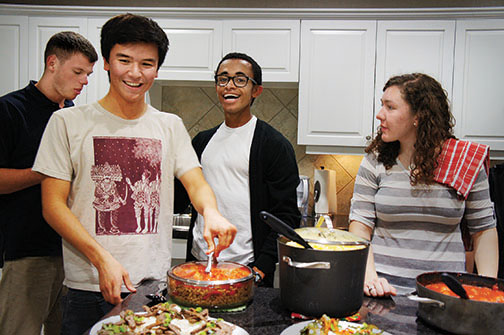‘Tell Me Your Story’
For students on a fall-break trip, a firsthand view of veterans’ issues
Among the trips sponsored by the Pace Center for students during fall break was one that sent a group to Washington, D.C., to focus on veterans’ issues. Ellis Liang ’15, the group’s co-leader and a member of the University Press Club, reports on the weeklong event:
Our first night in Washington, D.C., we encountered a Marine in a Safeway supermarket. Six-foot-5, barrel-chested, and drunk, he barged into our group and singled out a male student with a buzz cut. “You military?” the Marine asked. The student shook his head no, but pointed to the two Army ROTC cadets in our group.
The Marine laughed and joked that the Army did nothing but drag around gear. He thumped his chest proudly, boasting of his last deployment in Iraq. Accustomed to the Army-Navy rivalry, one of the cadets replied politely, “Thank you for your service.”
The Marine glowered. “You know why I hate when people say that?” he spat. “Because you have no f------ clue what you just said means.”
A hush fell over the group. He was right. Before volunteering to take part in this trip, most of the 11 students in our group had never met an Iraq or Afghanistan veteran. It was all too easy to even forget our country was still at war.
It was concern for this growing military-civilian gap that inspired my co-leader, Joshua Taliaferro ’15, and me to organize a seven-day trip to D.C. to learn about the struggles soldiers face upon coming home. We met with government agencies, nonprofits, and ex-soldiers who help transition veterans to civilian life. We talked with a documentary filmmaker and lobbyists pressing for veterans’ rights, played with therapy dogs, and cooked dinner for the families of veterans being treated at the medical center.
But nothing compared to hearing veterans’ accounts about what they endured on the battlefield and the struggles they faced after returning home. During a visit to Walter Reed National Military Medical Center, we met Adrian Veseth-Nelson, an Army captain and West Point graduate who developed post-traumatic stress disorder (PTSD) after two deployments to Iraq.
The stigma of PTSD within the military prevented him from seeking immediate help after returning to the States. “When I was drinking myself to sleep, I was still talking about how PTSD was for wimps,” he told us.
For Greg Nowak ’15, it was eye-opening to hear nurses at Walter Reed explain that PTSD is not a disorder, but a natural response to an adverse situation. “A big myth was that everyone came back from war damaged or came back with some mental illness,” said Nowak, a molecular biology major who hopes to become a neurologist.
Listening to the veterans’ stories of mental-health issues, unemployment, and bureaucratic obstacles was overwhelming, said Stacey Menjivar ’14: “It deglamorizes the military and what veterans go through coming home. It’s not flags being laid everywhere.”
One persistent problem described by veterans was the lack of understanding between the military and civilians. Veseth-Nelson described how yellow-ribbon bumper stickers and phrases like “thank you for your service” are examples of misdirected good will that do not make a difference.
His suggestion? Tell soldiers, “‘I appreciate what you’ve done — tell me your story.’ Start a dialogue.”
Since returning to campus, where there are few student veterans, our group has brainstormed about ways to apply our Washington experience.
ROTC cadet Ryan Fulmer ’16 pointed to the encounter with the Marine as a lesson in understanding what soldiers go through and in becoming a better leader when he becomes an Army officer.
There were other lessons as well. On our last night in D.C., we had dinner with Cameron Kerr, an Army officer who lost his leg while in Afghanistan.
“Earn back the sacrifice,” he said, urging us to remember the young men and women who died while in service. “Do something for the greater good. It’s more than just veterans that need help.”













1 Response
William D. Watson ’65
10 Years AgoValuing Veterans
When I returned to Princeton for my fifth reunion, I had been back from Vietnam for five months and was still on active duty. I left my uniform in New York City because I was afraid that if I wore it on campus, it would be defaced. Someone had arranged for a panel of graduating seniors to address our class on the evils of the war in Vietnam as part of our reunion.
Excoriating the troops has since become rare. I suspect part of the reason for the change was that such attacks proved to be politically counterproductive. Still, the “support the troops” replacement seems to be expressed more in terms of charity than respect.
Expressions of support for veterans, particularly combat veterans, often involve implicitly or expressly defining them as a disadvantaged group that, like other such groups, needs special assistance from normal folks.
Changing the script, as suggested in “Tell Me Your Story” (On the Campus, Dec. 4), isn’t terribly convincing. If you want to demonstrate that you value rather than pity veterans, become one.